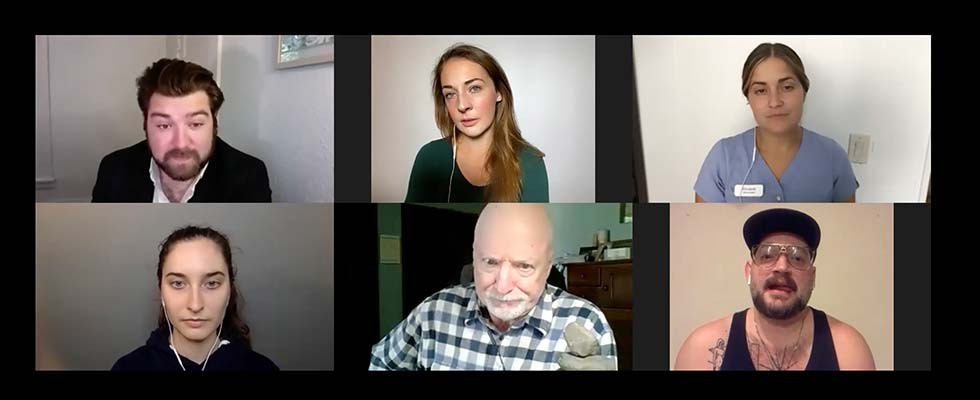
Do not go gentle into that good night,
Old age should burn and rave at close of day;
Rage, rage against the dying of the light.
—Dylan Thomas
Dylan Thomas’s iconic poem, voiced by a son begging his father to resist death, epitomizes the struggle all humans must face and the grief and sadness that accompany the process of dying. Today, that process comes with tough decisions about life-extending treatment, hospice care and funeral plans. Now, the Hospice Foundation of America (HFA) is seeking to ease the process for families with a series of plays aimed at breaking down stigma about the end of life.
One play in the series, “Dusk,” which was presented via Zoom on August 13, follows a man with congestive heart failure. On the eve of his 68th birthday, Gil Everette and his adult children—aided by a home health worker—discuss his wishes about life-sustaining treatment options.
The story emerges through a series of flashbacks to the children’s youth, exploring the family dynamic between the siblings and their father. In the present, Gil struggles to come to terms with his illness and with his daughter’s wishes for an advanced directive. Gil embodies Thomas’s poem, raging against his impending death with sarcasm and anger, even suggesting he would rather end his own life than consider undergoing additional treatment.
The play also dramatizes the burden many women experience as family caregivers. Nan, Gil’s daughter, lives in the same town and much of his care falls to her. One of her brothers has moved away and travels frequently for work; his efforts to help fall short. And while the other brother does pitch in, the emotional toll falls to Nan, leading to arguments among the siblings about how to handle Gil’s care.
Elizabeth, a home health worker, tries to direct the family through the process by explaining the many choices that come with end-of-life planning and creating an advanced directive. Her character demonstrates the important part homecare providers play in helping patients and families cope with making these decisions.
Following the Zoom presentation, HFA held a panel discussion with hospice and advanced planning experts, including Frederick Health Hospice Executive Director Carlos Graveran and Penn State Milton S. Hershey Medical Center’s Dr. Lauren J. Van Scoy, who were joined by the playwright, Brian Harnetiaux.
The panel addressed issues around end-of-life planning, such as doctors’ hesitancy to bring it up and a lack of access for underserved communities. Recent studies have found that roughly 60% of the United States’ population has engaged in advanced care planning, but less that 24% of Black and Hispanic populations have done so.
“I think I had a predisposition for subjects surrounding death and mortality,” said Harnetiaux. “But the real imposition for me tackling the subject in theater was my father’s death. I wrote a play about that … In my father’s protracted illness, I was just ill-prepared to deal with the complexity of the issues. I’m thankful to the hospice and palliative care community for letting me do field work. It’s been one of the joys of my life to work through all of this, and it’s helped me resolve some of my own issues.”
Harnetiaux wrote “Dusk,” the play that preceded it and a third that focuses on a younger family handling care planning. All provide an opportunity for self-examination and community dialogue on fundamental questions surrounding death and dying. Each play can be used individually or in any combination by hospices, churches, medical schools and other organizations as an educational tool and as a vehicle for creating public dialogue about end-of-life issues, according to the HFA website. Licenses for the trilogy are available for $450 for a year’s access, and the packet includes discussion questions for those viewing the play.
